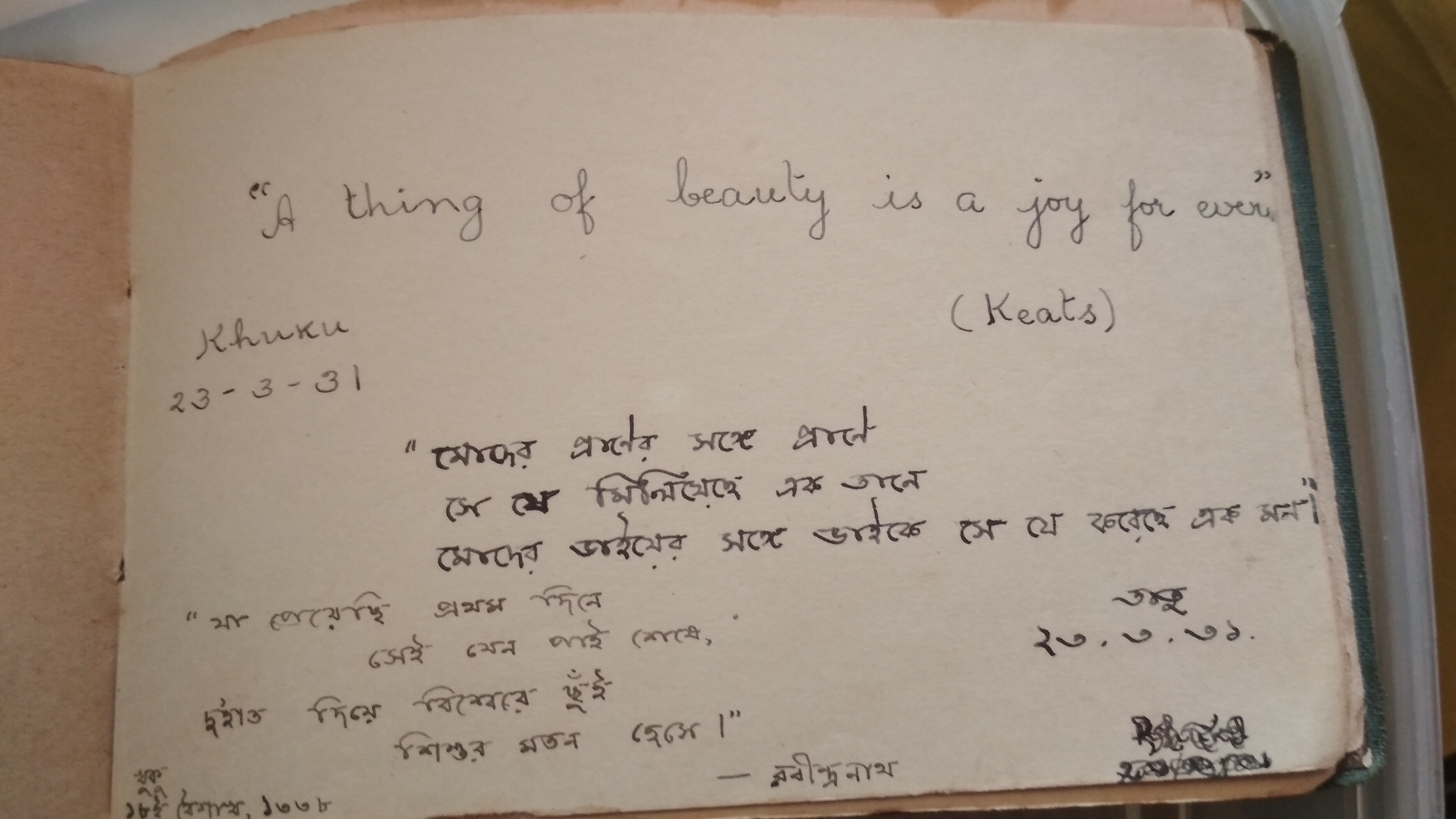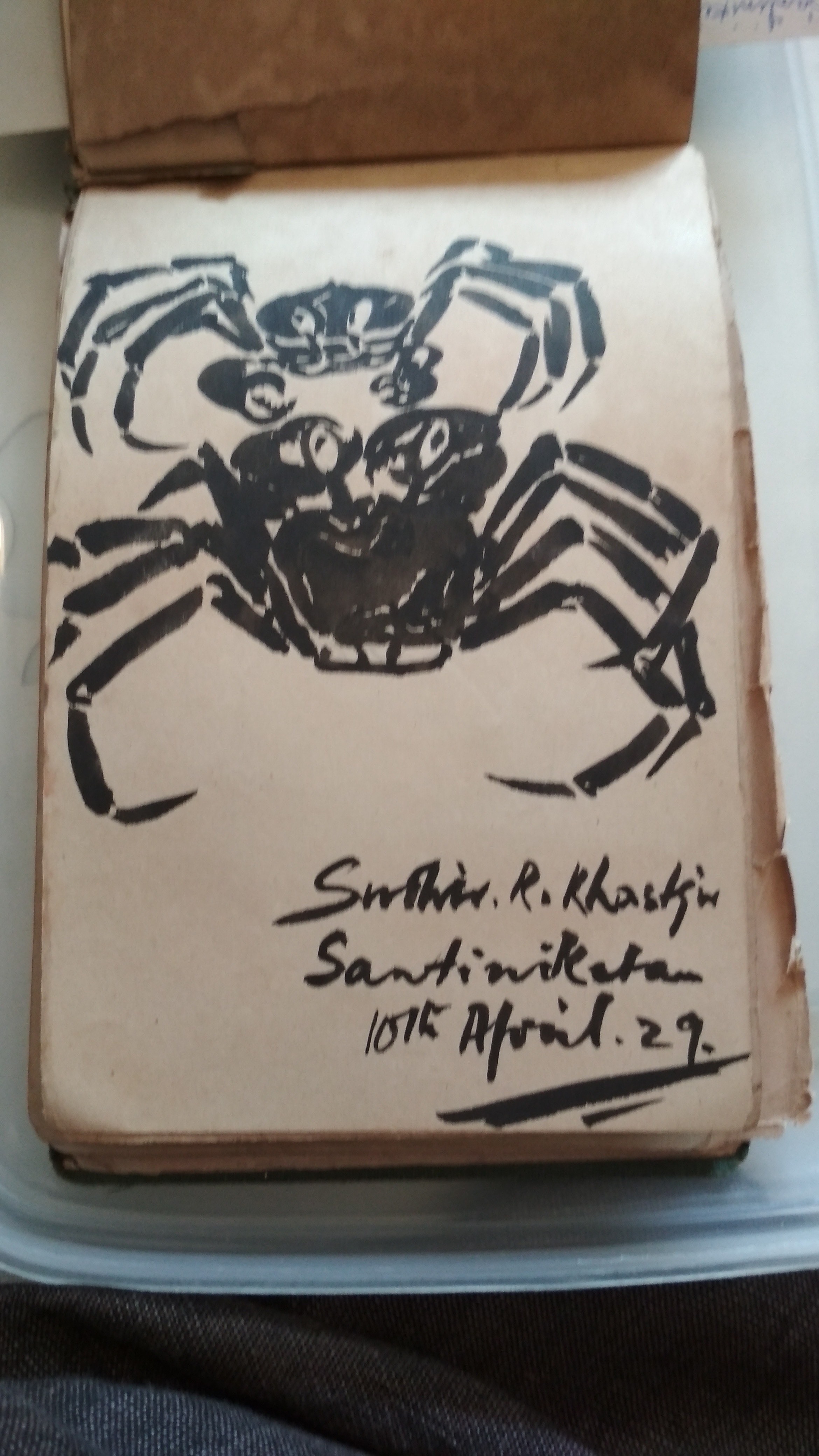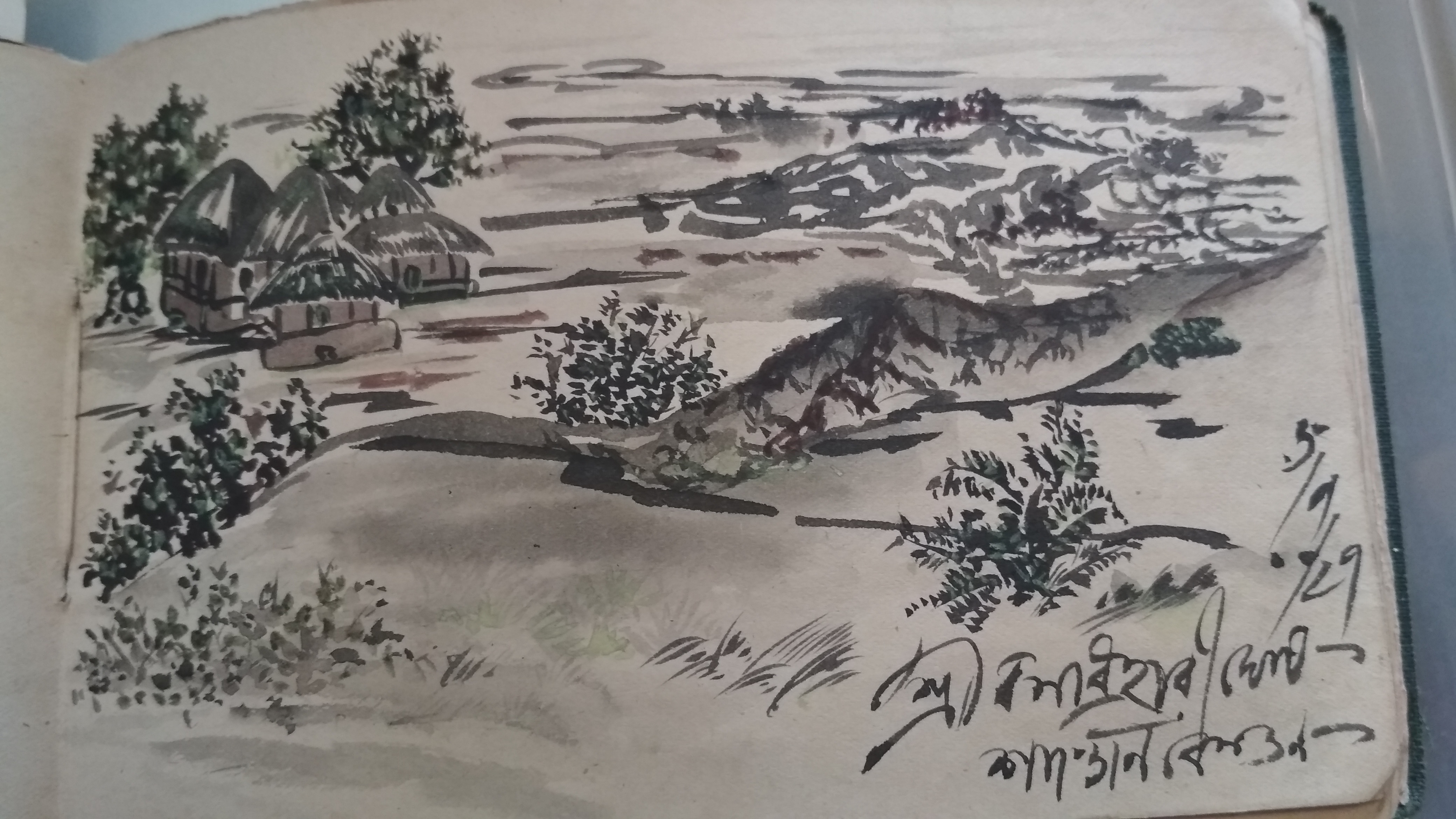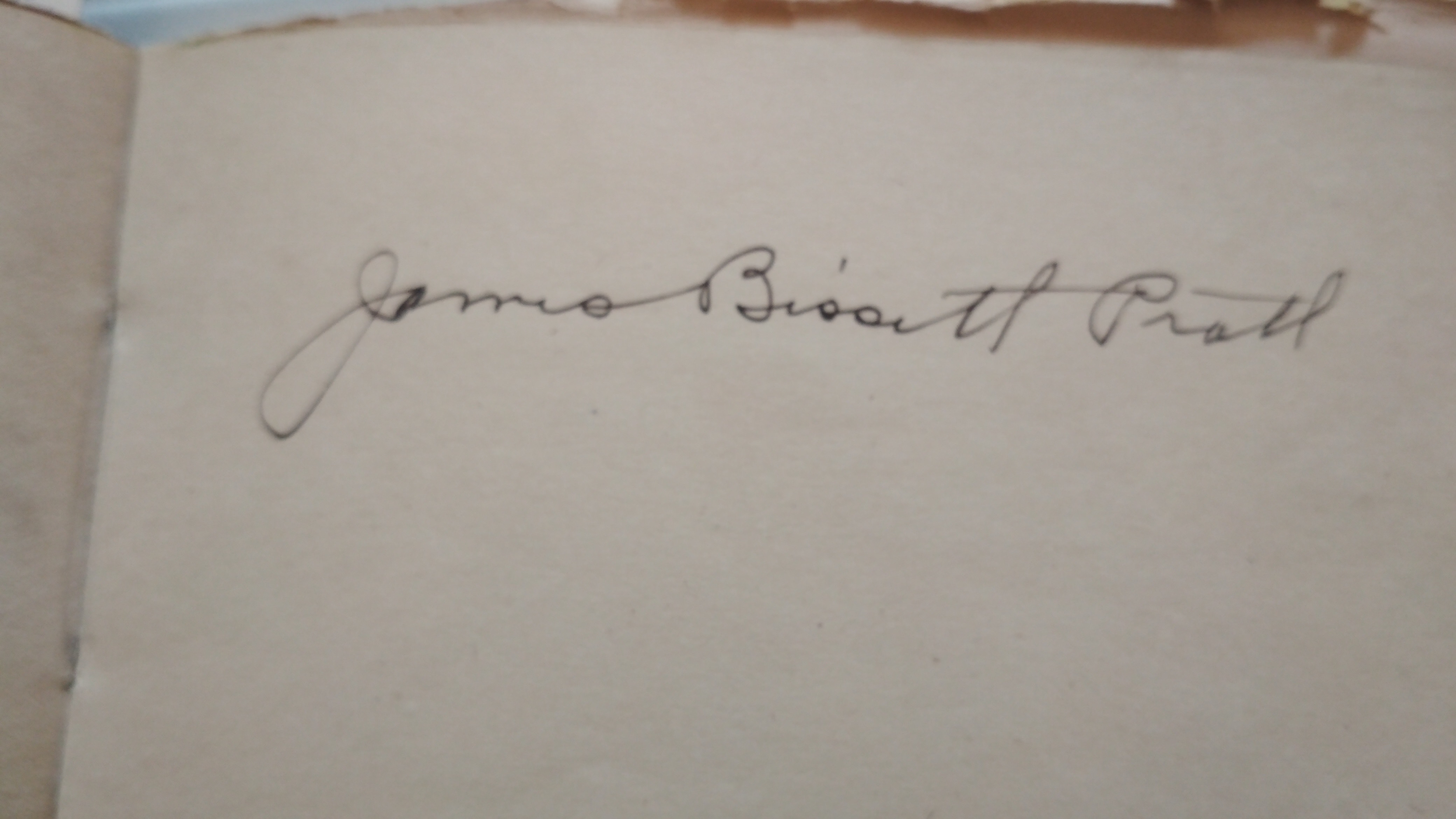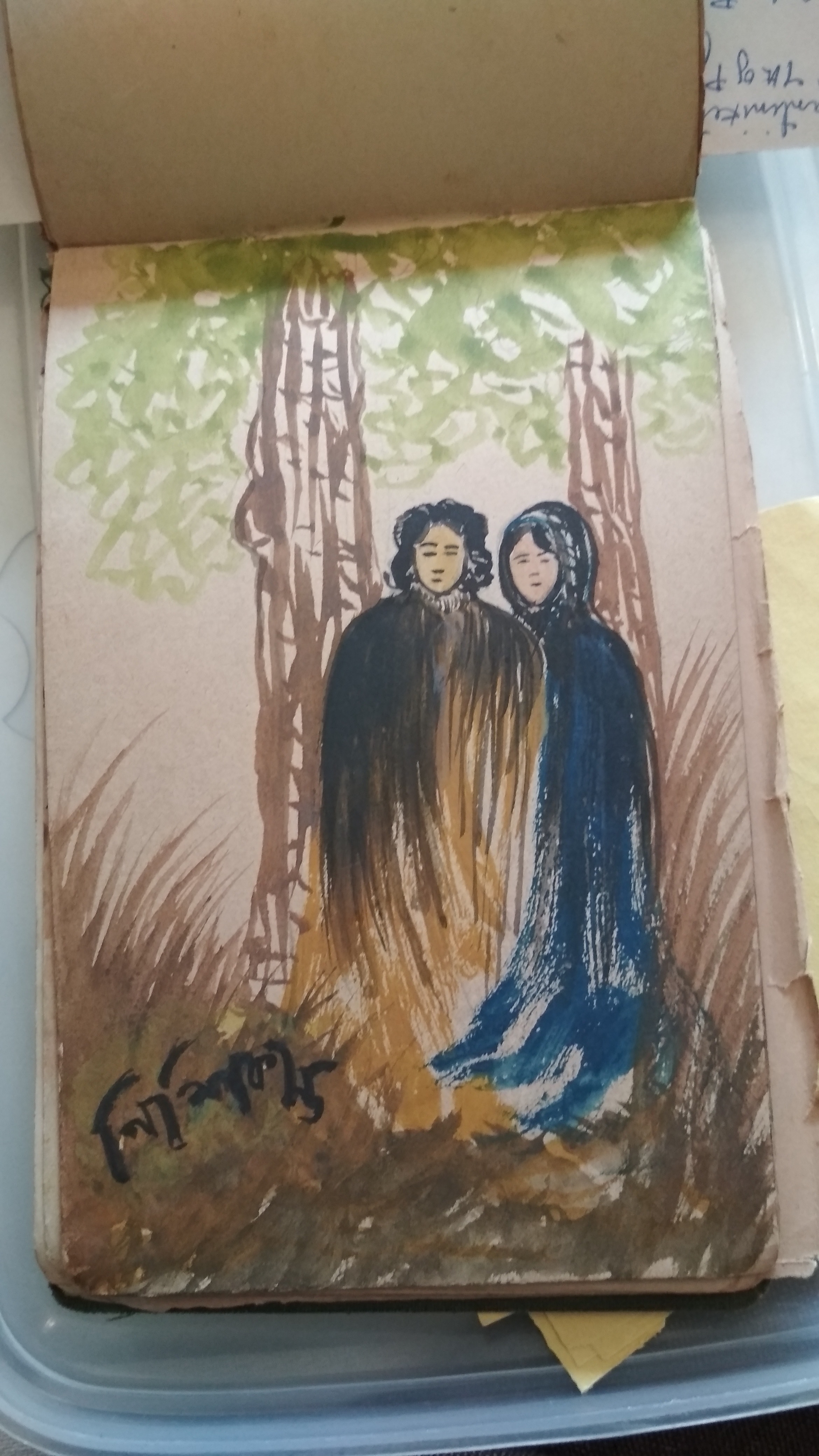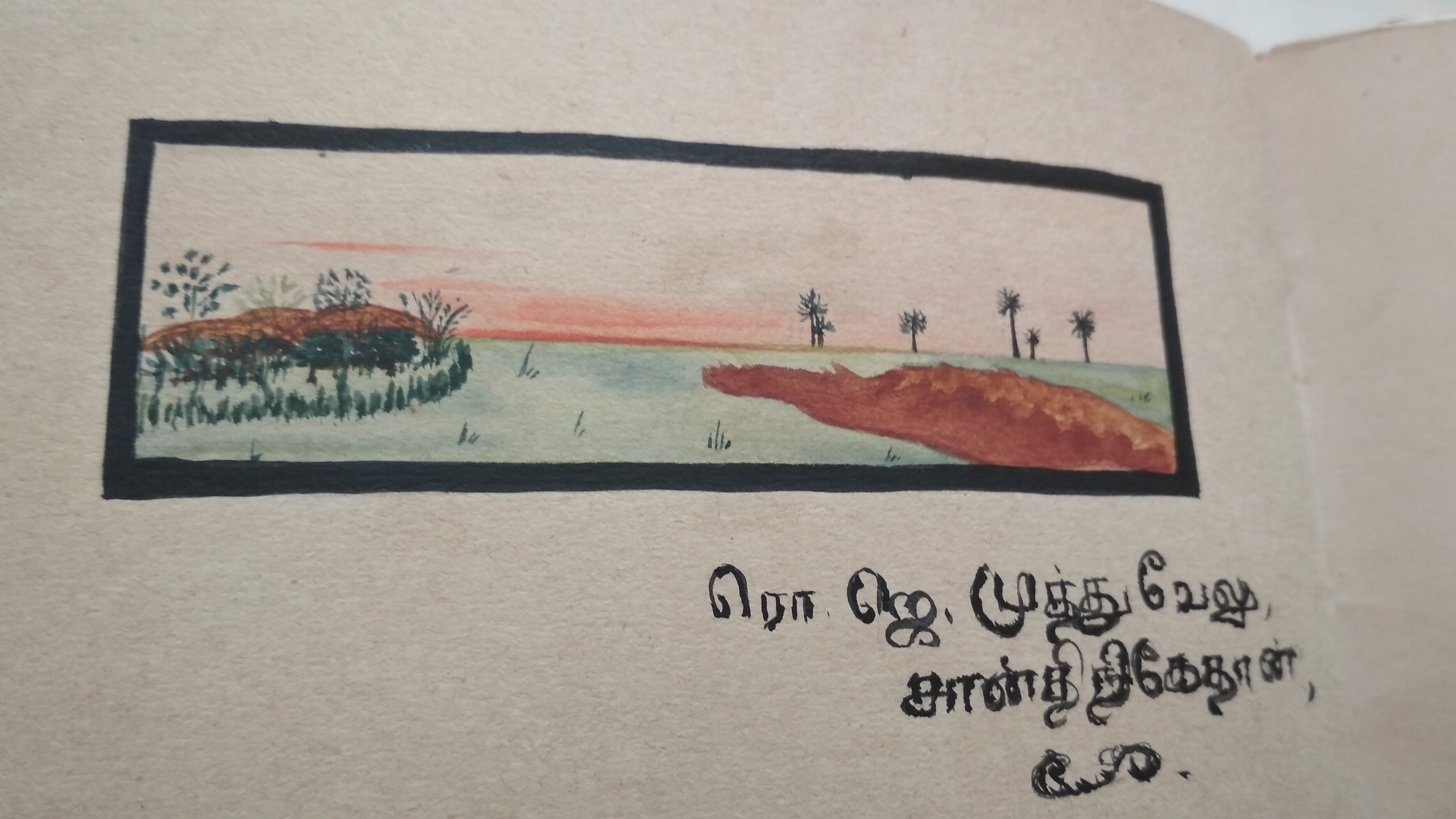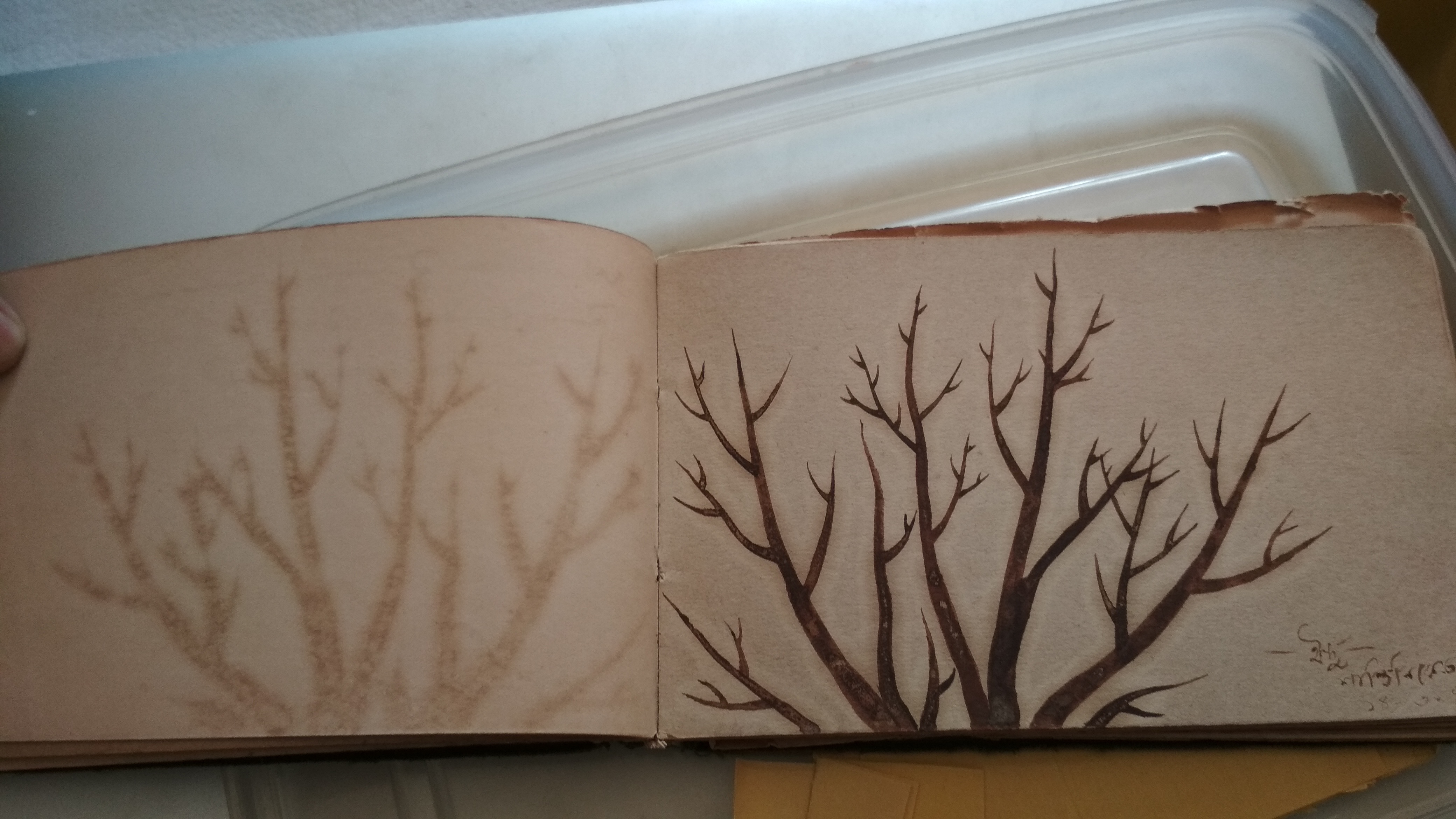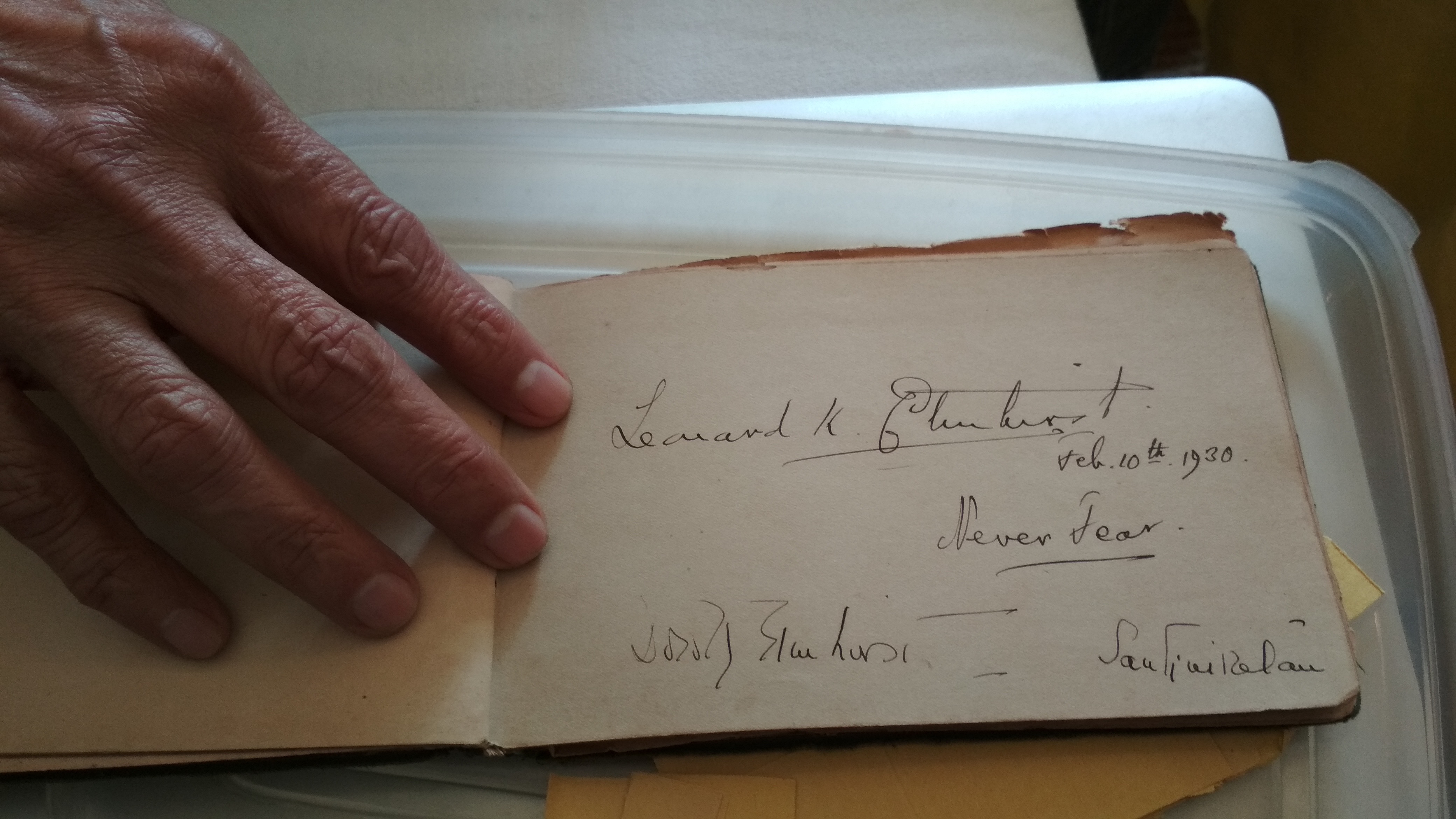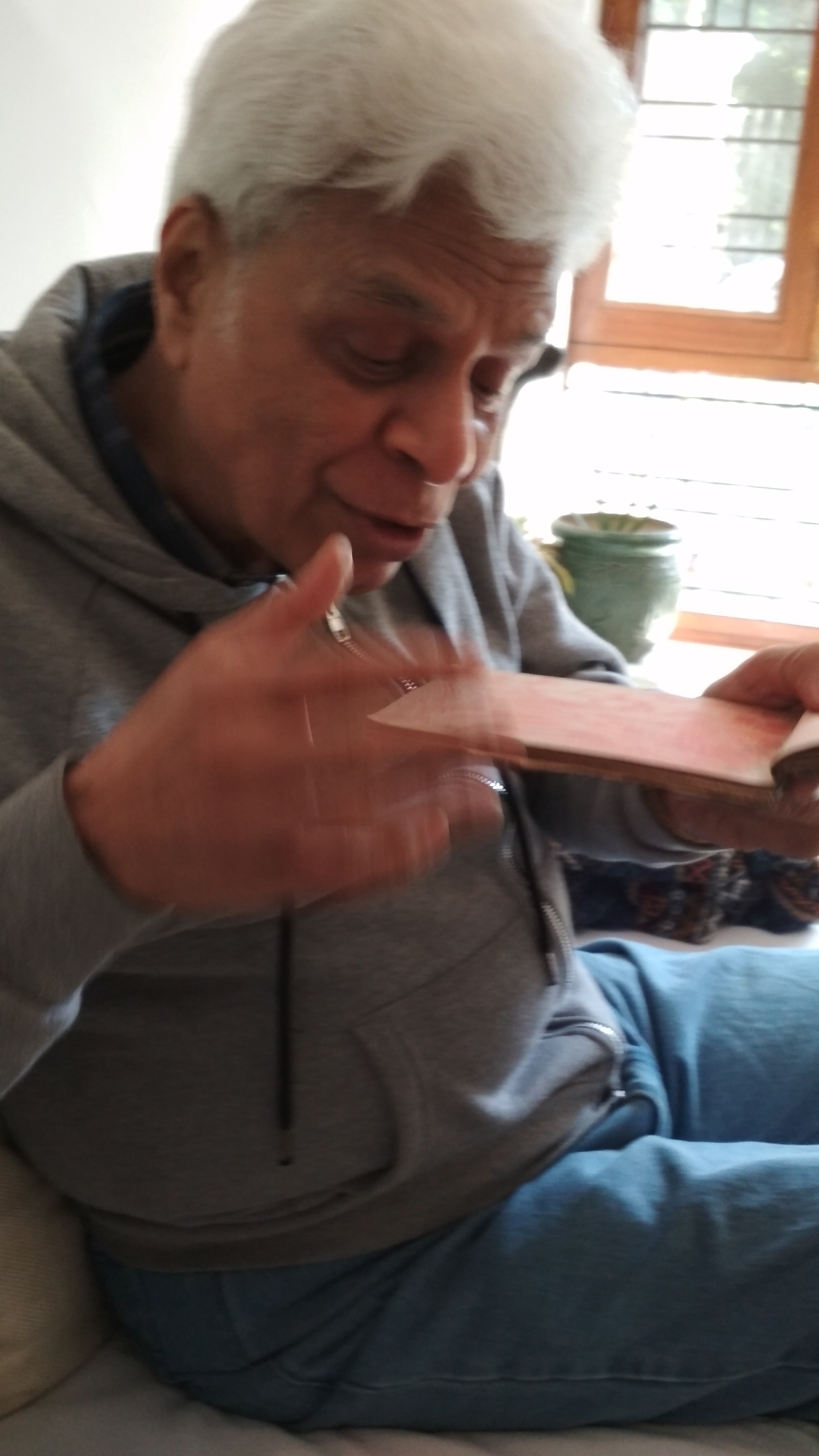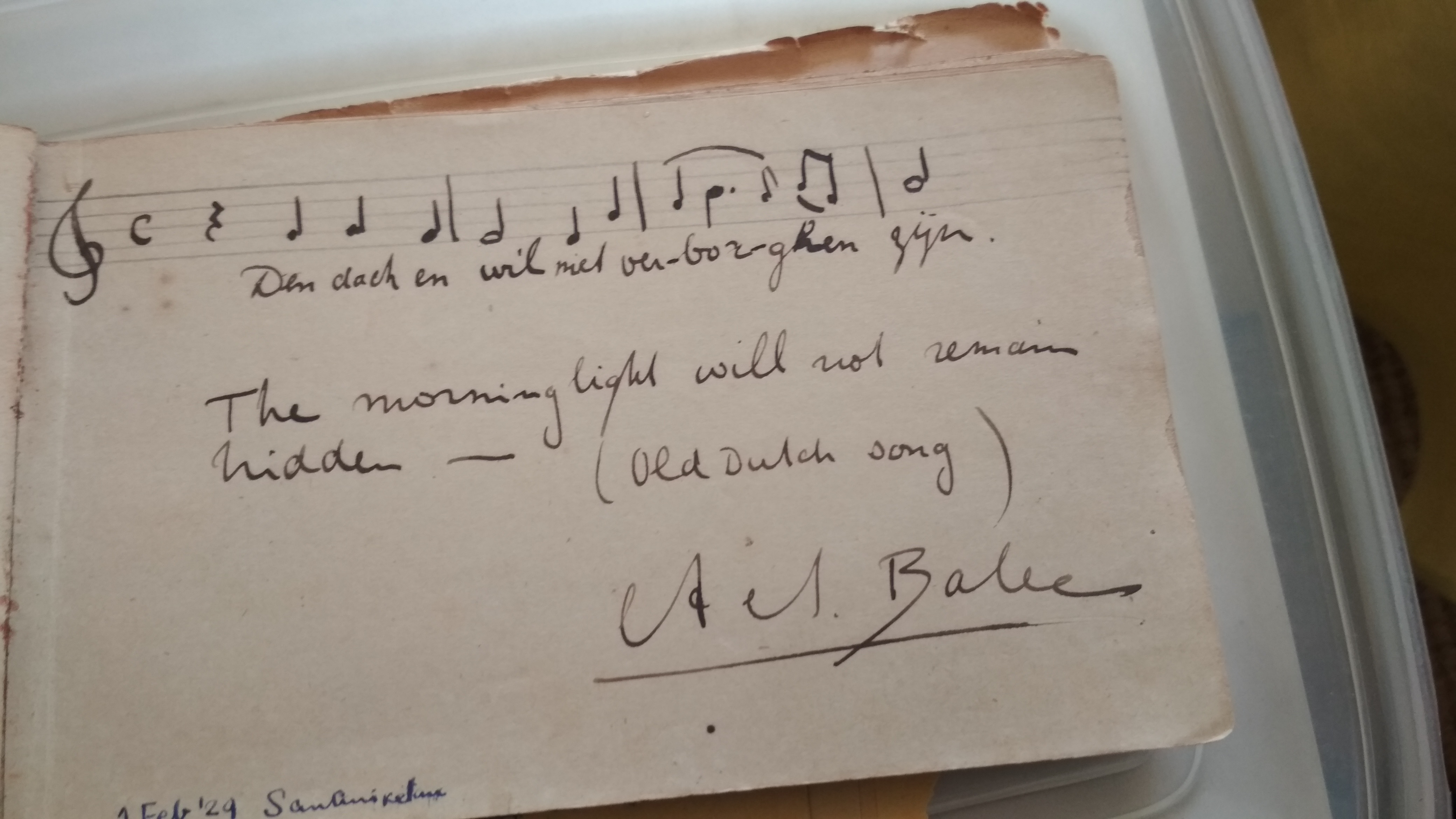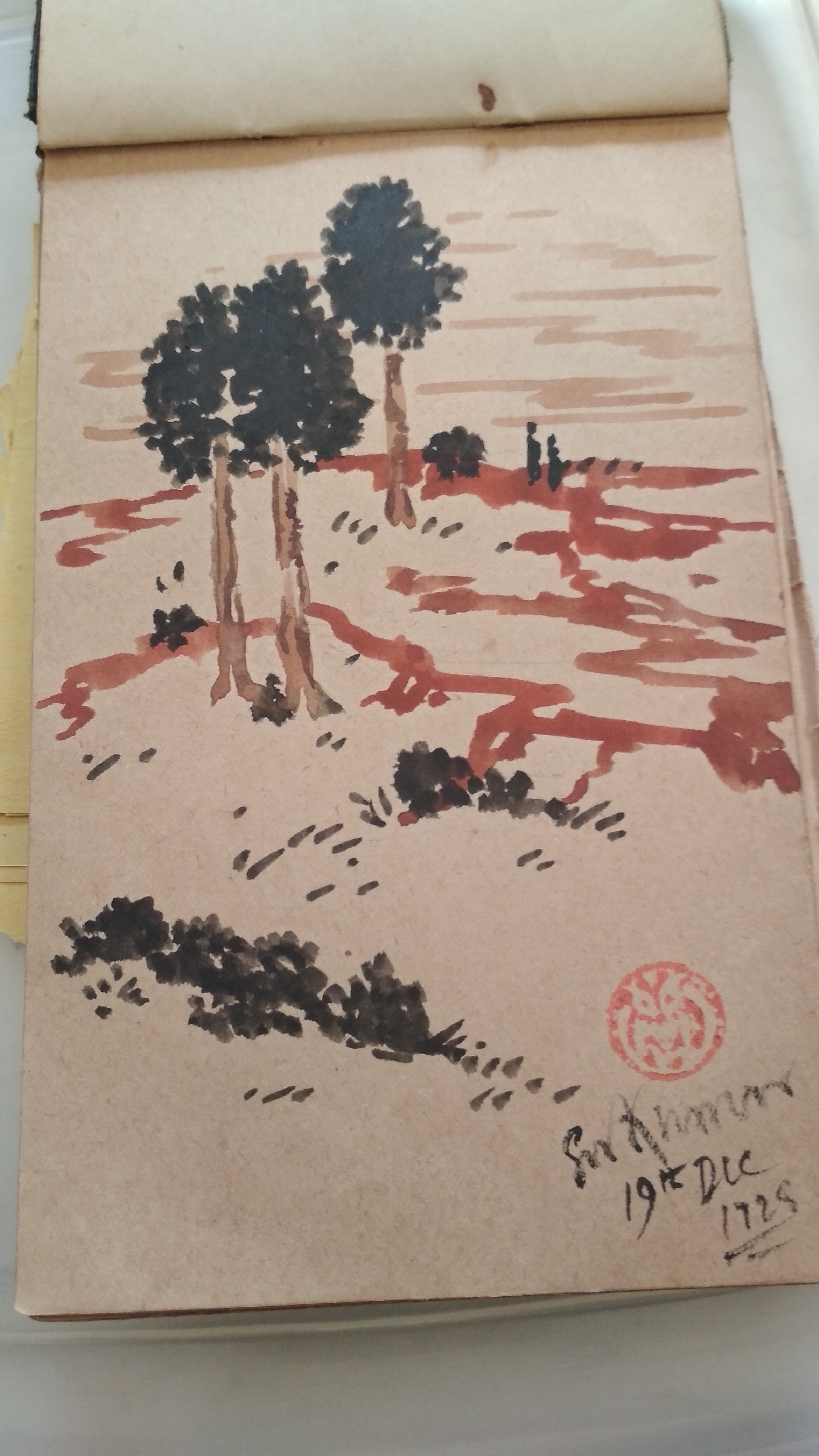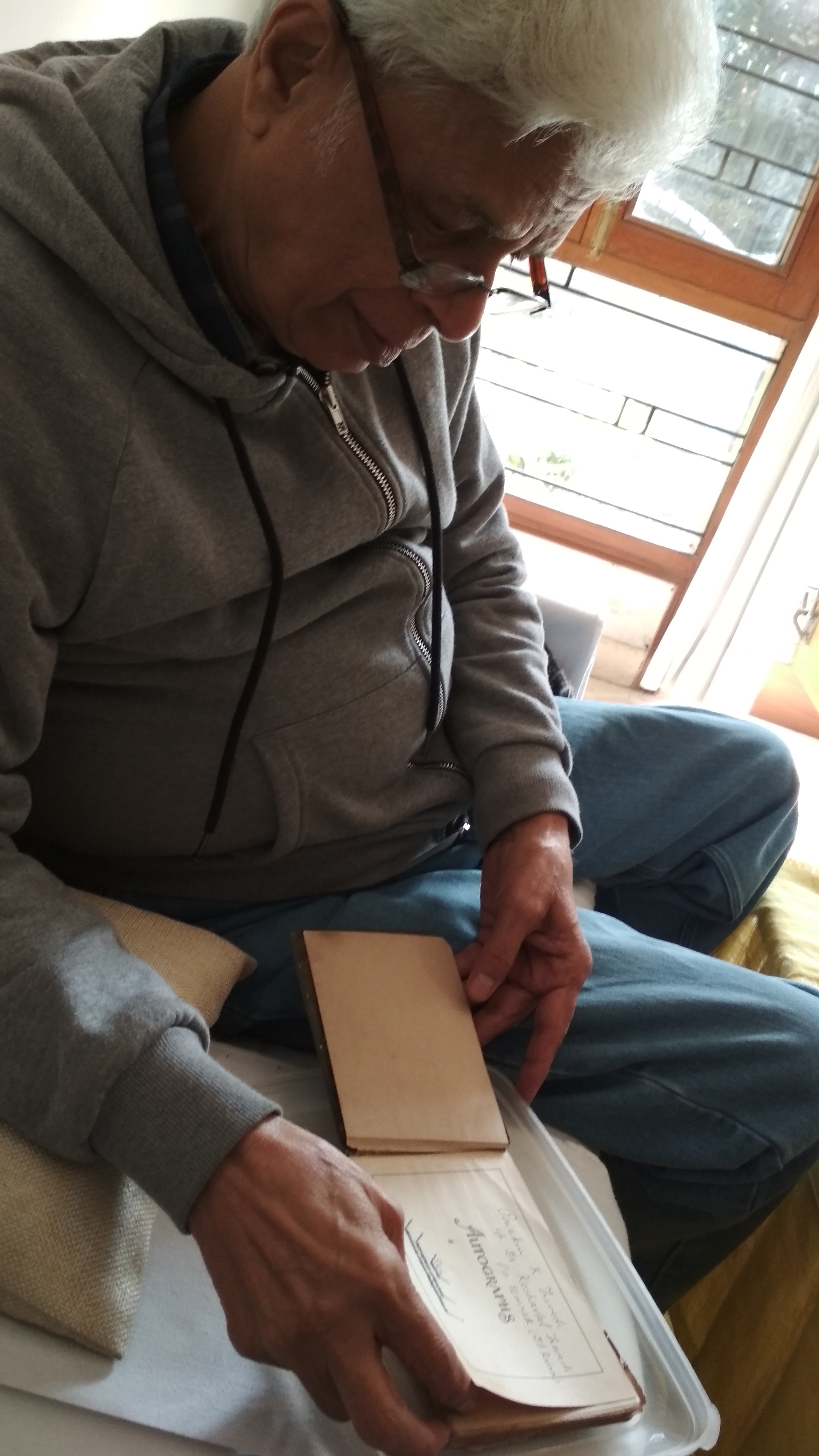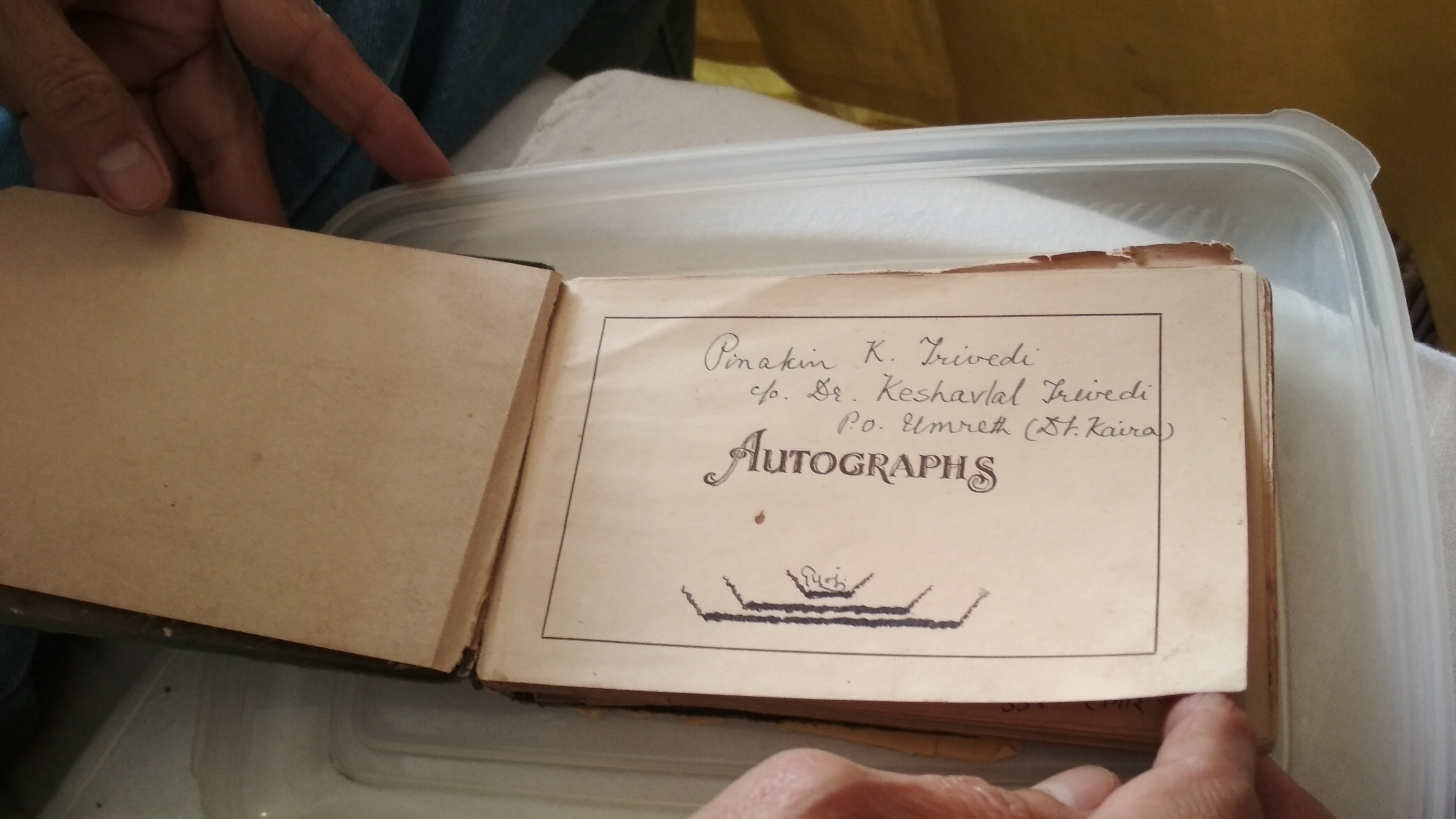
Pinakin Trivedi and the Autograph Book
Pinakin Keshavlal Trivedi was a 21-year-old Gujarati student in Santiniketan whom Arnold Bake had recorded in 1931. I met his son, Devkumar Trivedi (born 1939), in Delhi in 2019. The British Library has Pinakin’s age as 19, because that is what Arnold Bake’s notes say, but Devkumarji clarified that his father was born in 1910. Their original home was in Kapadganj, but following his elder brother, Pinakin had come to Santiniketan, from Umreth, where their father was a doctor.
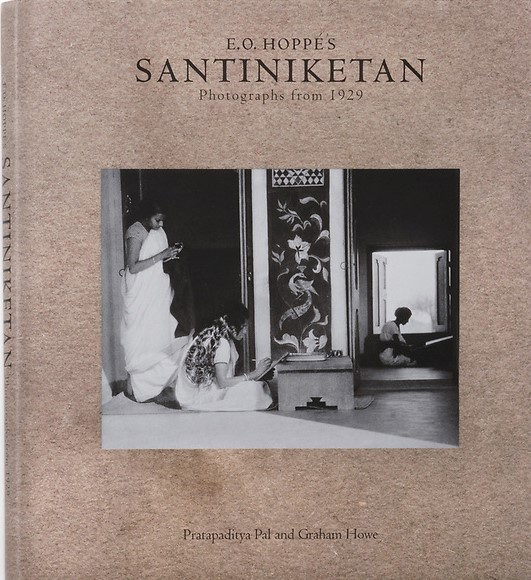
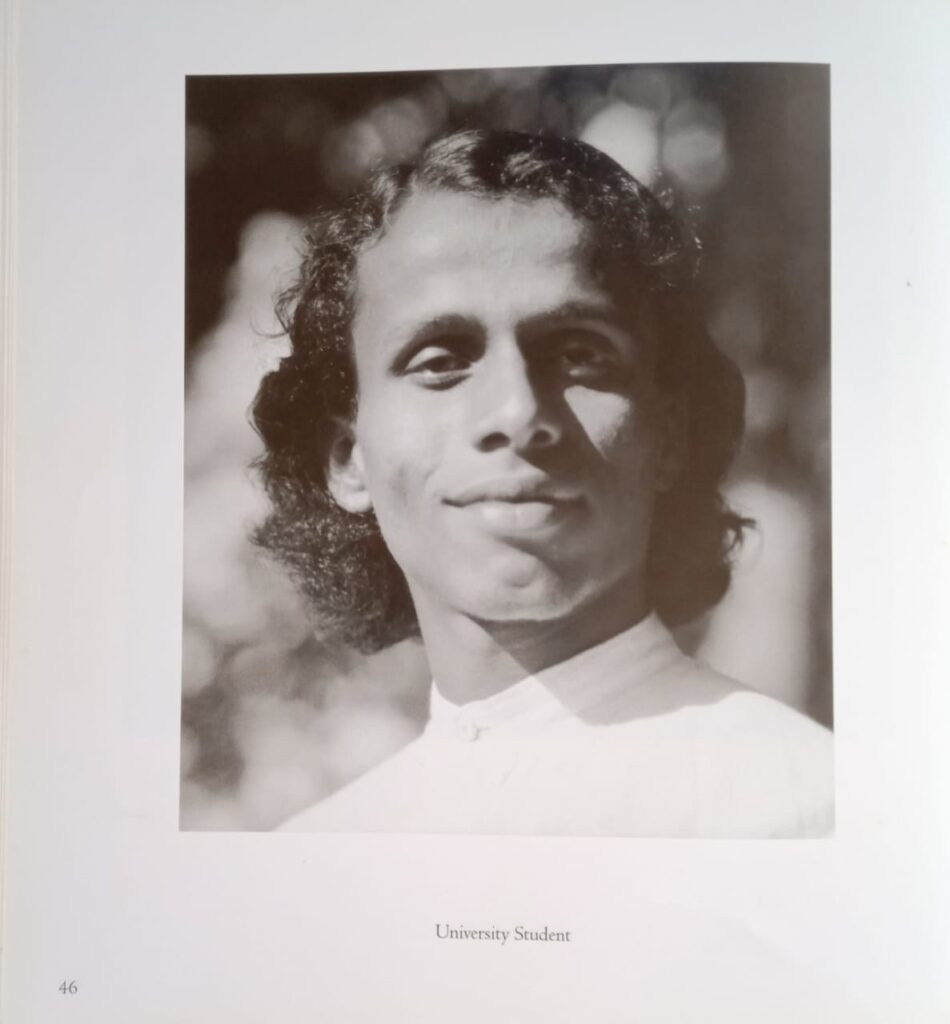
Pinakin Trivedi in E.O. Hoppe’s catalogue, Santiniketan (The Marg Foundation, 2010), although the caption does not give his name, just mentions him as a ‘University Student’.
Bake recorded Pinakin on 13 wax cylinders (four with the phonograph he had loaned from the Berlin Phonogramm-Archiv and nine with his Ediphone machine); songs of Kabir and Mirabai, garba songs and a cradle song, a few of which can be heard here. The archive’s metadata does not give the exact date of recording, but I think they were recorded on two separate days. Because, on 7 April 1931, Bake wrote to his mother: ‘In addition, I have reached out to several students to try and get hold of songs from other provinces. The one boy that came here and sang these interesting ballads from Gujarat has returned from Calcutta, so I will start working with him soon.’ On 15 April 1931 he wrote that he had already recorded Pinakin and was hoping to record some more.
I had heard the Pinakin Trivedi recordings at the archives in London and then after the Time upon Time: Arnold Bake in Bengal exhibition in Santiniketan in 2016, when Lars Christian Koch, the then director of the Berlin Phonogramm-Archiv, proposed to work with The Travelling Archive to produce a set of CDs on Arnold Bake (a project which did not materialise), they shared copies of their Bake in Bengal holdings with us. So, I had four songs of Pinakin Trivedi in my possession. It is these songs which lead me to a fabulously rich collection of material from the life of Pinakin Trivedi, especially relating to Santiniketan, which is kept closely guarded by his son, Devkumar Trivedi. I have only just begun to unpack this collection and for now I am presenting a few snapshots from this wonderful material, which I will work on more in the future. The Pinakin Trivedi collection is an archive of its own, which leads us to many other archives.
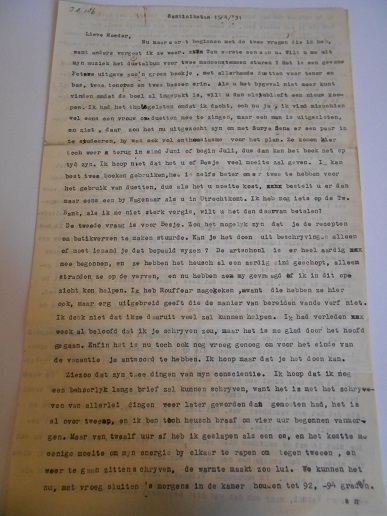
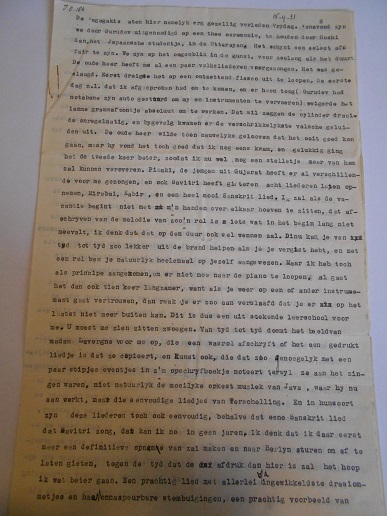
Pages from Arnold Bake’s letter to his mother of 15 April 1931. Mark how Bake wrote Pinaki, minus the ‘n’ in his letter! Photographed while working at Special Collections, Leiden University Library in 2015
I asked writer, filmmaker Ruchir Joshi, a friend, if he would listen to Pinakin Trivedi’s songs, since he would understand the language. He wrote back to say he had shared them with his friend Salil Tripathi, the writer, and Salil said Pinakin Trivedi was the music teacher of his New Era School in Bombay; that was before his time, but everyone knew about him as he had composed their school anthem; he had even seen him at school functions. I met Salil in London on 23 October 2018 and we had a long chat. Salil sang me their school anthem, ‘Dhanya New Era’, and I jumped with joy. This was the exact same melody as ‘Amader Santiniketan’, the Santiniketan anthem! I felt as though I had already started to find the Pinakin Trivedi of Santiniketan whom Arnold Bake had recorded and who I was looking for.
Later, on 11 December 2018, when Salil was in Mumbai, I went from Kolkata to meet him and the musician Atul Merchant, who was also a student of New Era. The idea was that Atul would put me in touch with Pinakin Trivedi’s son, whom he knew.
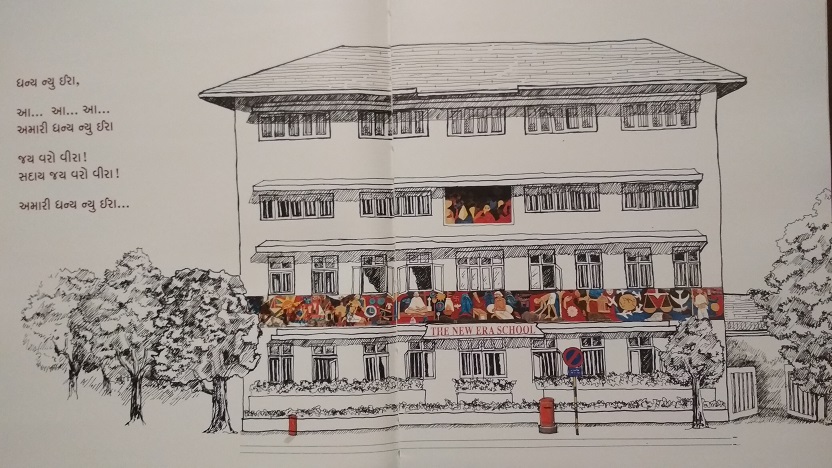
Sketch from The New Era Odyssey, a commemorative volume published by the school alumni in 2017, which Atul very kindly gifted to me.
In the Foreword to this commemorative volume on New Era School, Salil wrote: ‘In 1930, as the Indian tricolour was unfurled on the banks of the river Ravi in Lahore and the Indian National Congress unleashed the struggle for poorna swaraj, or “complete independence”, two brothers from Rajpipla in Gujarat, Chandulal and Maganbhai Vyas, founded a school opposite Gowalia Tank maidan in the city that was then known as Bombay […] The Vyas brothers were inspired by the philosophy of Annie Besant […] They named the school New Era. Later Chandulal’s son, Kantibhai and his wife Bhanuben, carried the torch forward. […] New Era ushered in a new way of thinking, where education had to be compatible with the new age and be relevant for a new time, where the child’s potential was more important than what the school’s curriculum insisted; where the teacher was the artist who helped the child discover her or his talent and set the child free; where the mind was without fear and the head held high. That Tagorean reference is not incidental – for a major source of inspiration for the Vyas brothers was India’s first Nobel Laureate Rabindranath Tagore.’
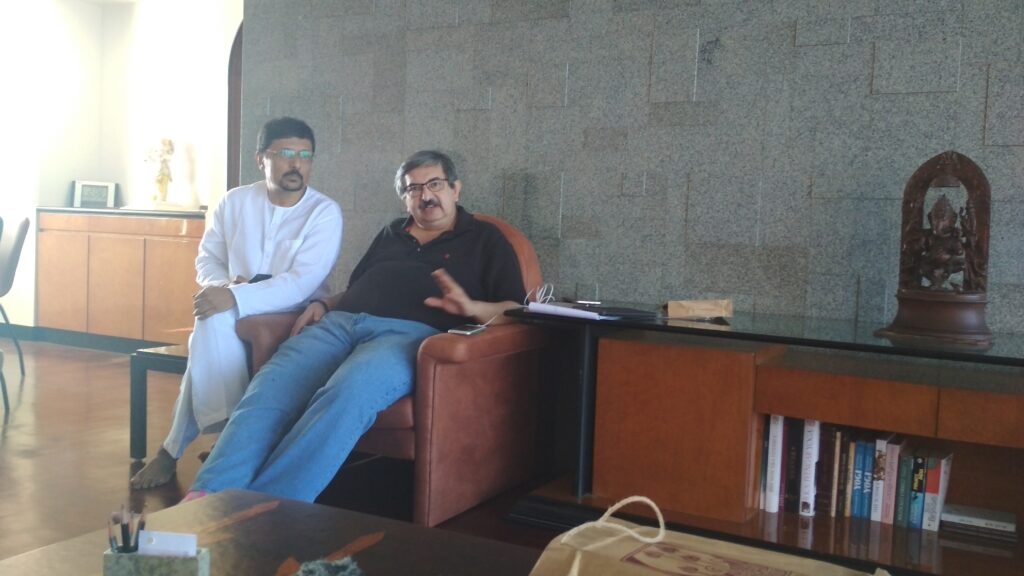
Atul Merchant and Salil Tripathi in Atul’s home in Mumbai. 2019. Photo by Moushumi
Salil, Atul and I had a long conversation about Pinakin Trivedi and music in New Era School and I left my recorder open for whatever we were saying. Atul played me songs of Pinakin Trivedi, arranged by him. This is a clip from the recordings I made that day.
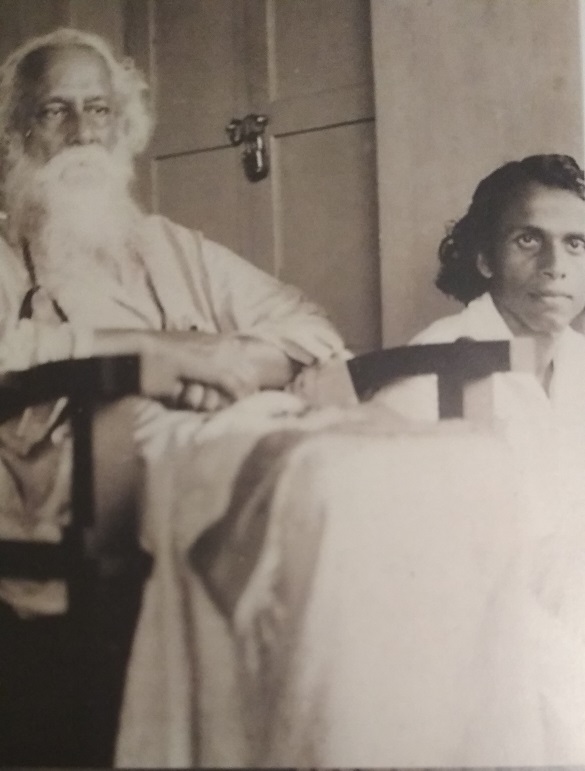
In the ‘Santiniketan archive of Pinakin Trivedi’, there are more photos of others which he had taken, fewer of him with others. Like Arnold Bake, he was recording the place and the time with his camera. There are amazing overlaps, because when we look at Bake’s photos and films and Pinakin’s, such as of Basantotsav, 1931, we know they were in the same place at the same time. At the same time, their archives are also very different, as they were on campus in different capacities and saw the place with different eyes. As his son Devkumar Trivedi said, Pinakin took so many photos of Rabindranath that at one point Gurudev asked him: Have you got a thousand photos now? This one of guru and shishya is from the New Era commemorative volume.
It is through Atul and Salil that I was able to connect with Devkumar Trivedi. I spent two delightful days amidst Pinakin Trivedi’s things in Devkumarji and his wife Ashokaji’s home in Delhi on 27-28 January 2019, over meals and many cups of tea.; sometimes their musician son Kem would come down from his upstairs apartment. A whole world of Santiniketan as recorded by Pinakin and archived by his son opened up before my eyes. Devkumarji preserves his father’s archive with utmost care. A retired senior bureaucrat, he is himself a beautiful singer and extremely proud of their family heritage—music runs in our blood, he said. He did not know about these recordings of his father from 1931 and as he listened, he remembered things and sang along. Devkumarji brought out his father’s photographs from Santiniketan, neatly kept in files, wrapped in plastic. It felt like we were entering a temple. He brought out copies of the handwritten Gujarati magazine Usha, volumes of Pinakin’s diary Manasi. He talked about Gurudev as though he himself had been taught by the poet, and about Khuku (Amita Sen, the Tagore singer who died prematurely), with inherited intimacy. Devkumarji preserves the long message Khuku had written in Pinakin’s notebook as a parting gift. He asks me to read it out, as it is in Bangla. I read, and explain.
On 27 February 2019, Devkumar Trivedi listens to Bake India I, cylinder 15, song ‘Avi rudi ajavali raat’, a garba song sung by Pinakin Trivedi in Santiniketan in April 1931, exact date unknown. I recorded this video with my phone.
I asked Devkumarji what had taken his father to Santiniketan. He sang bits of song to me and explained that it was Tagore’s songs in the first place that had caught his father’s imagination. Devkumariji is such a beautiful singer!
He also told me about his Pinakin Trivedi’s very deep connection with the songs of Tagore and sang lines of several songs that his father had rendered into Gujarati.
The photographs record the dynamic world of students and teachers of the asram, across age and gender, the close relationship of the teacher and the student and a flow of life and creativity within Santiniketan. His photos are different from Arnold Bake’s, who recorded other aspects of asram life through his images. Bake recorded lives of teachers and scholars and their families; the international community; village life surrounding Santiniketan or the accidental encounter with the itinerant singer.
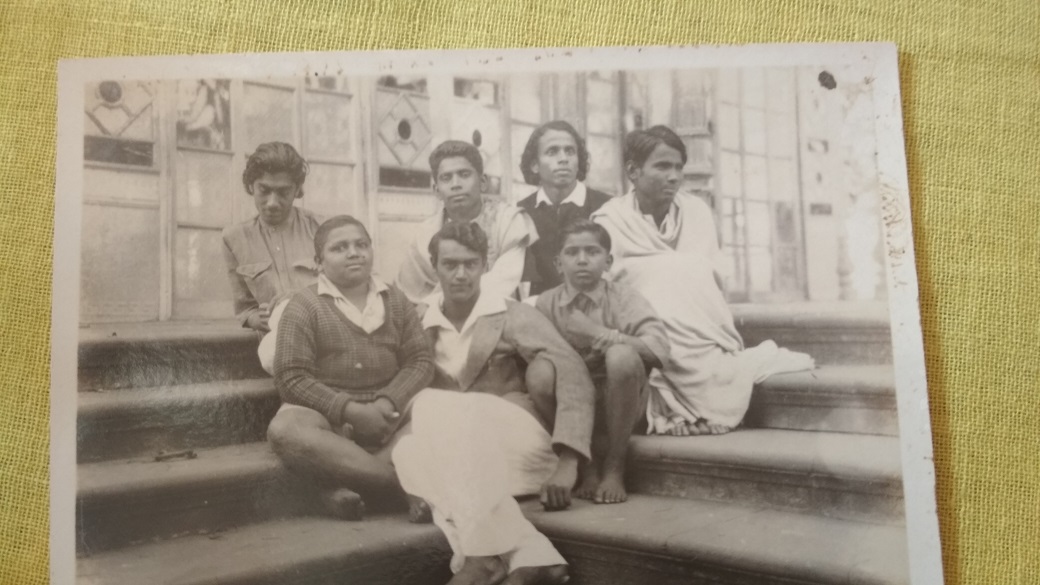
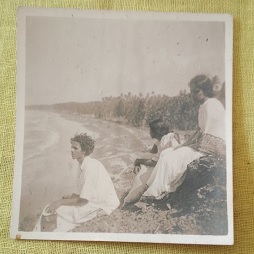
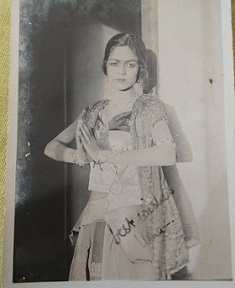
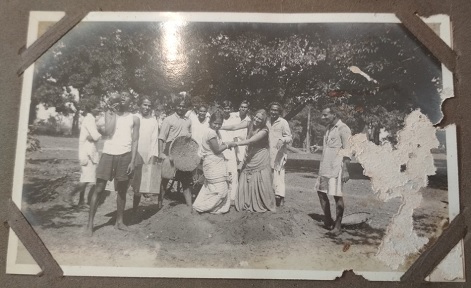
Photos from Pinakin Trivedi’s Santiniketan albums. I took these photos of his photos with Devkumarji’s kind permission.
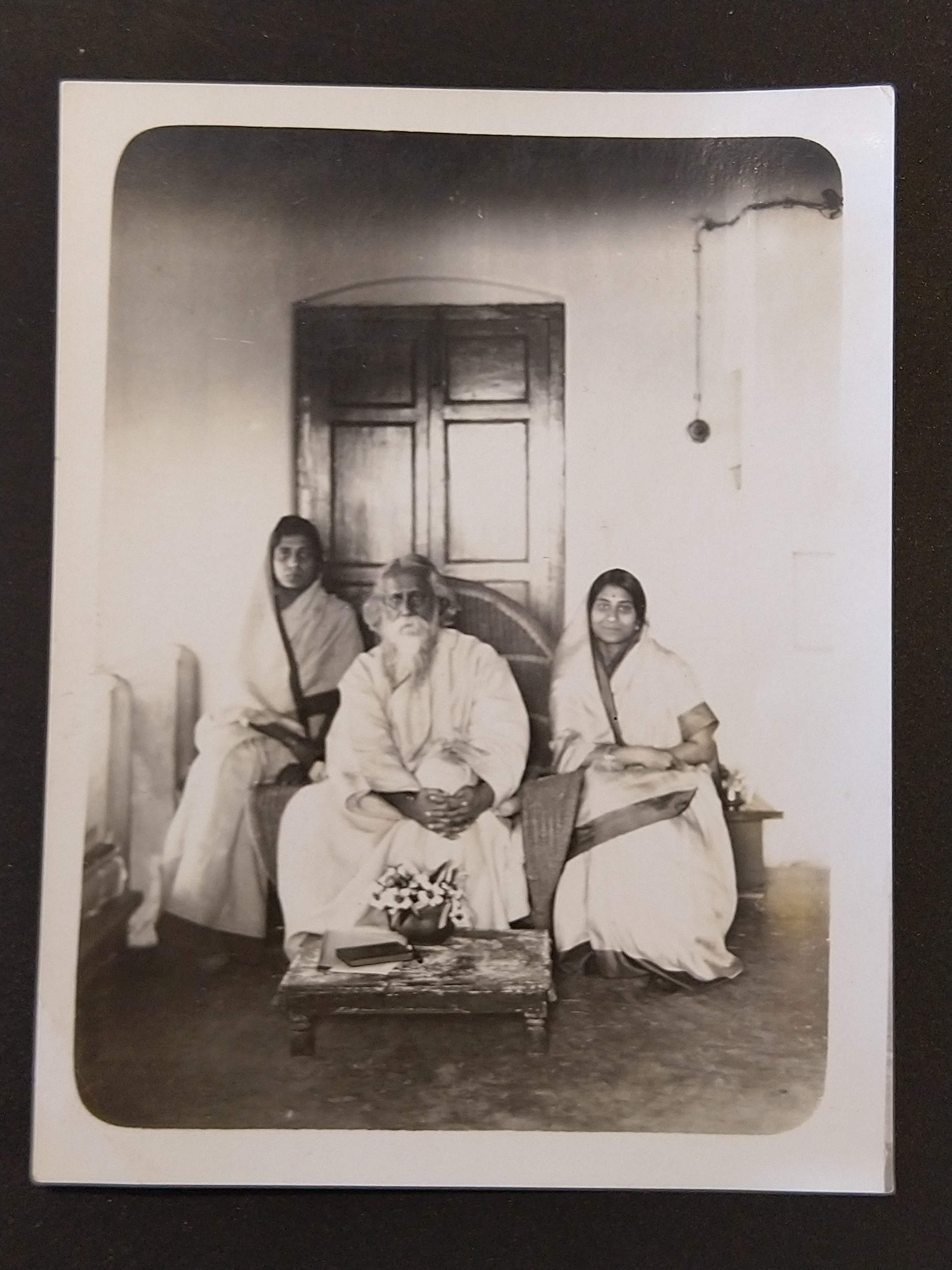
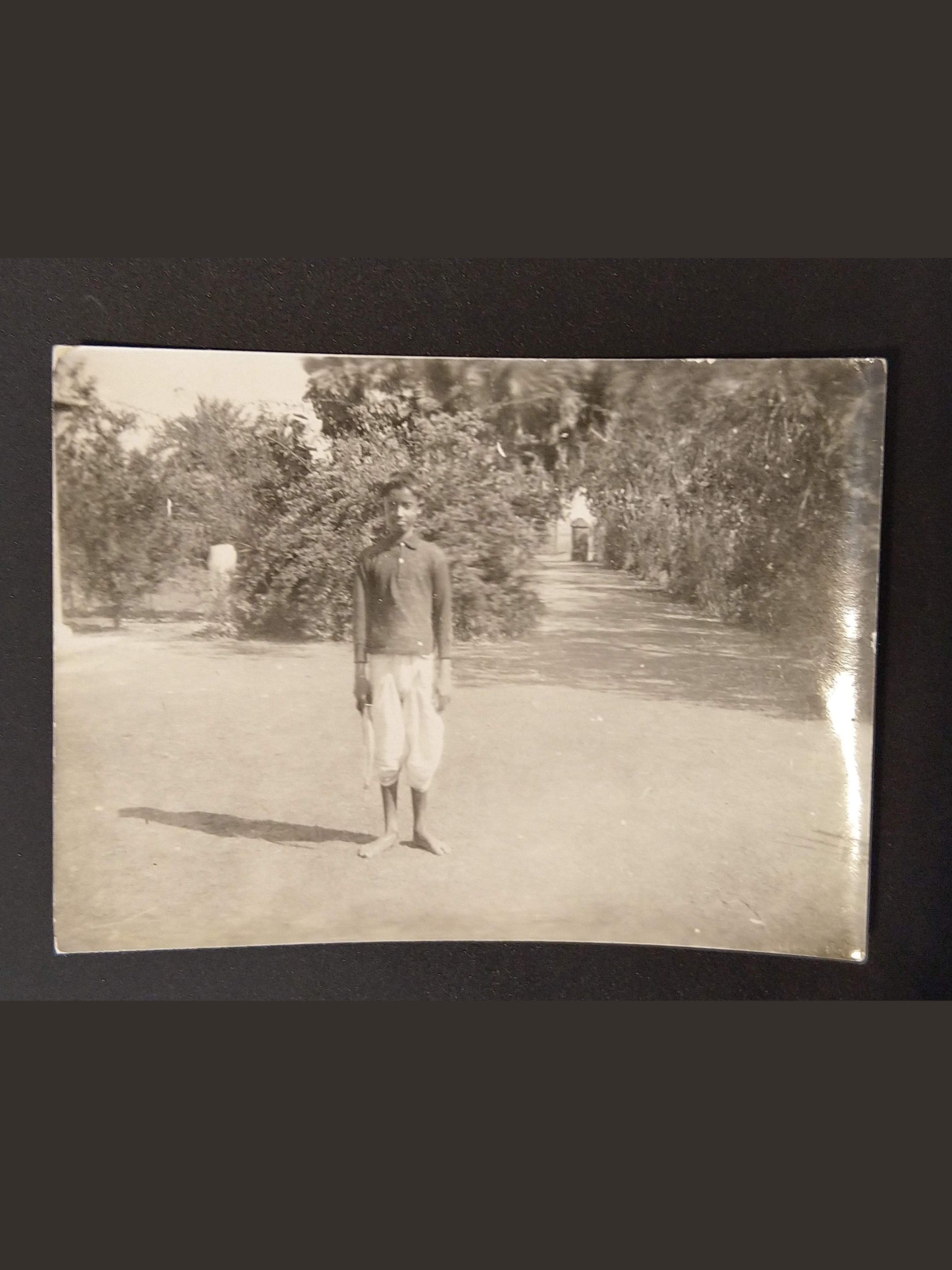
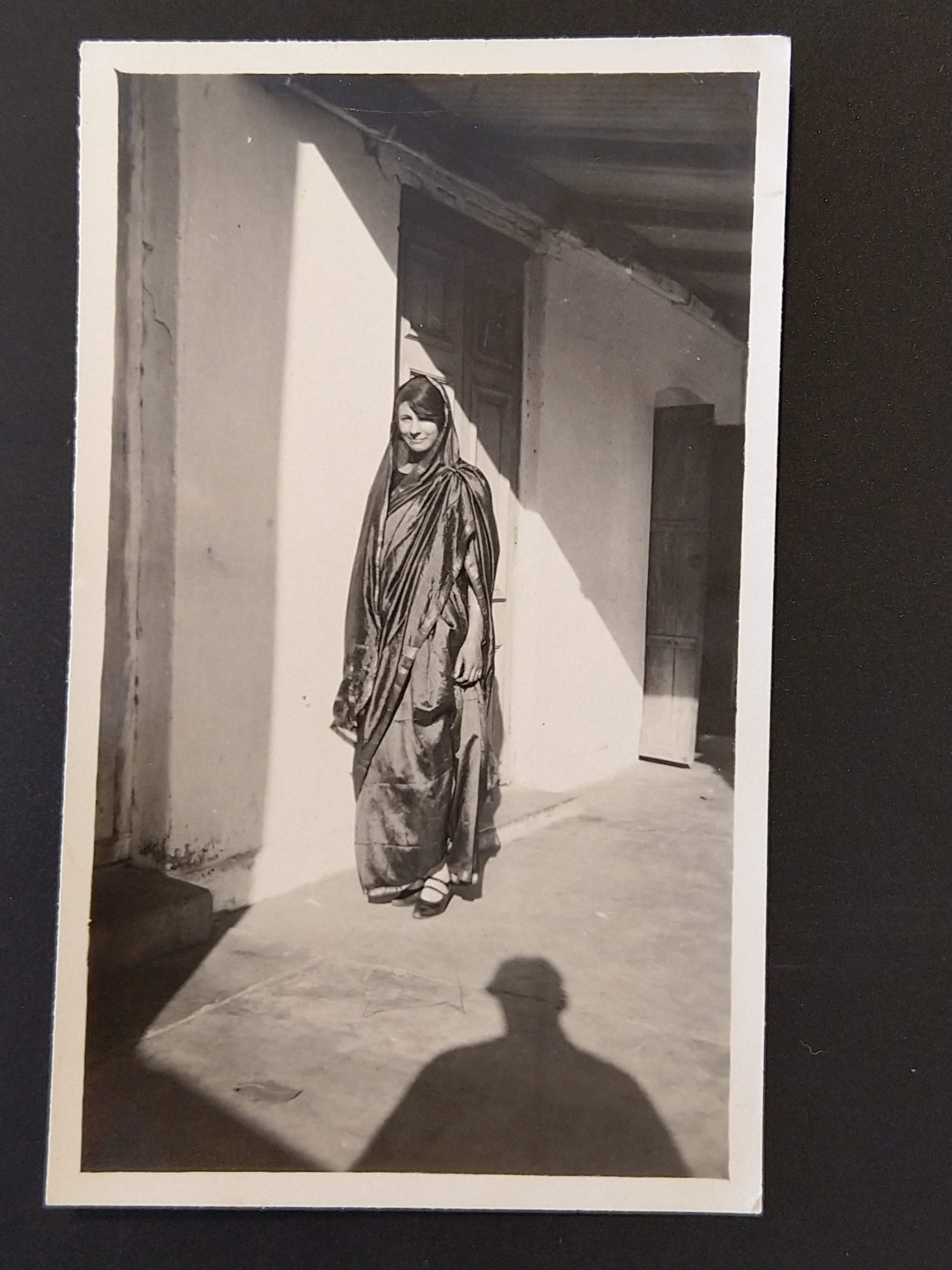
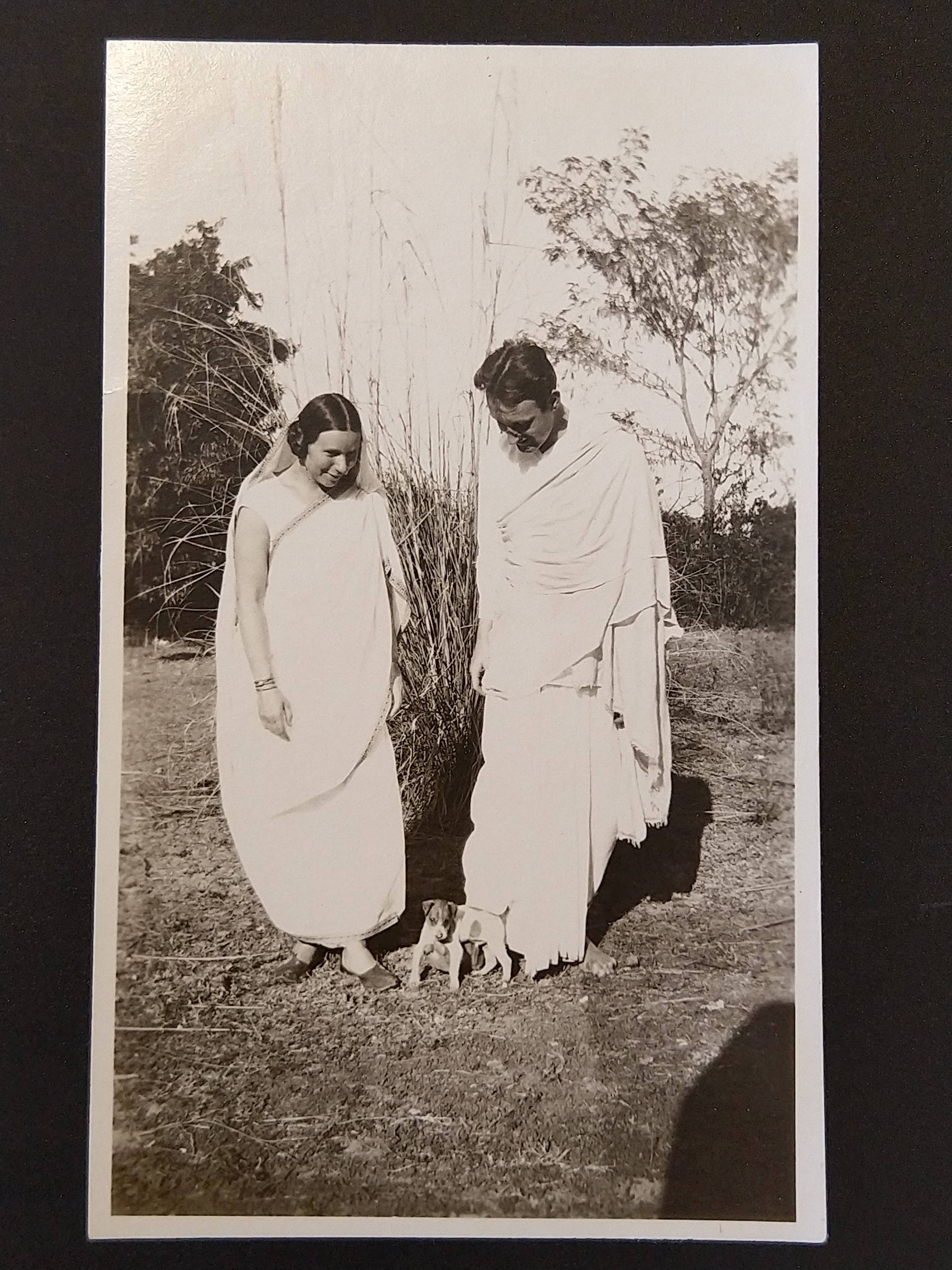
Contrast Pinakin’s images with Arnold Bake’s Santiniketan photos. Source: Special Collections, Leiden University Library (photos of photos)
The last and final treasure that Devkumarji brought out to show to me was Pinakin Trivedi’s autograph book. It is hard to describe this book, because it holds so much wealth. The material feels too delicate to touch. There are signatures and messages, poetry and song from the widest range of people who passed through Santiniketan during the years of Pinakin’s stay, between 1928 and 1933. What is most interesting is that Arnold Bake’s signature and message too are in this book. I have started to work with this material with some colleagues. Hopefully, I will be able to make something worthy of it at some point. For now, I am sharing a few photos. After meeting Devkumar Trivedi, I brought my recordings and images from his home to Santiniketan and shared them with art historian and curator of Nandan gallery of Kala Bhavan, Visva-Bharati, Sushovan Adhikary on 27 April 2019. I went to him with my publisher friend Sumita Samanta. Sushovanda was clearly amazed to see the images, and he helped me identify a large part of the material. There are many voices from different times and places which the material leads us to.
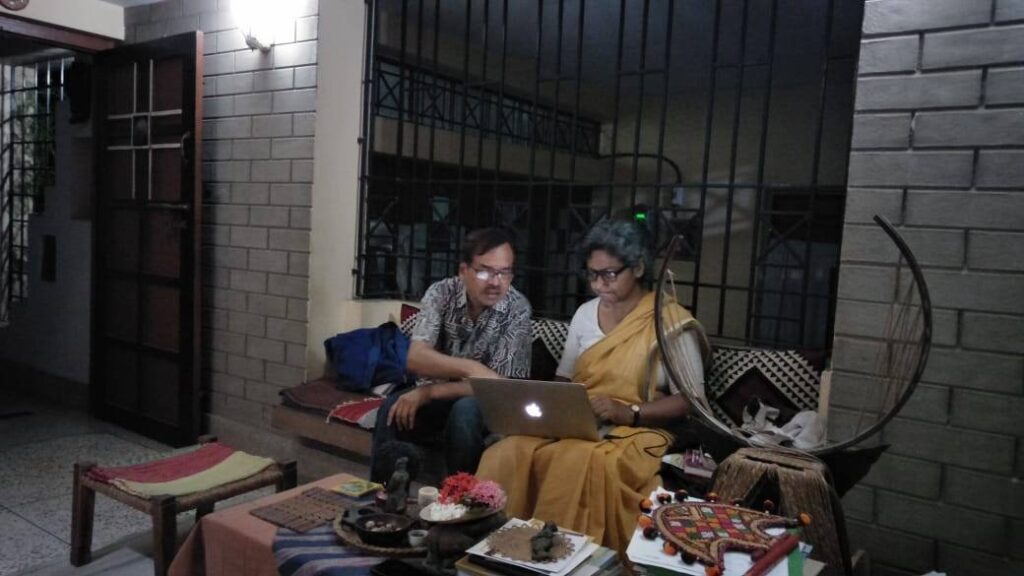
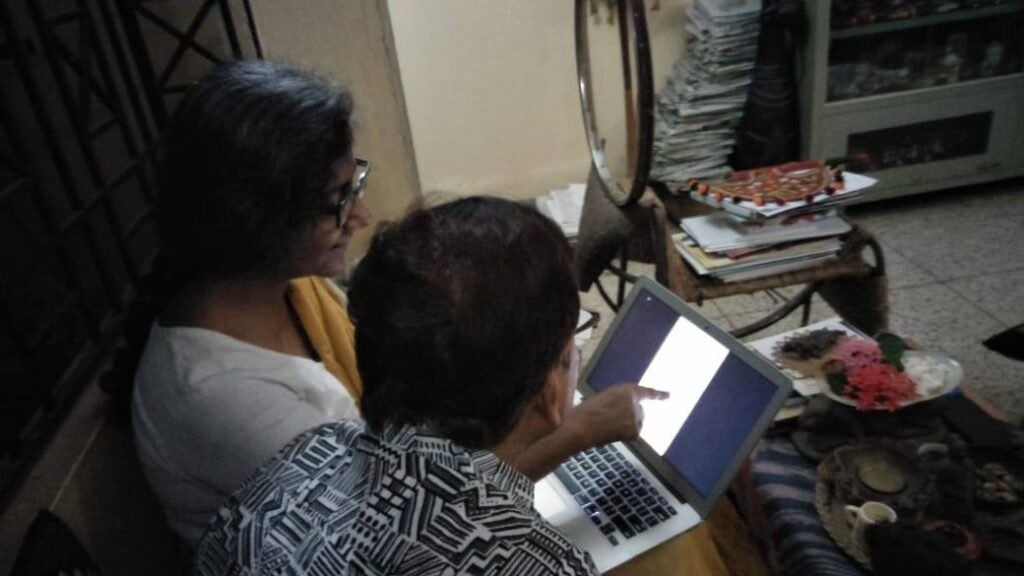
Moushumi and Sushovan Adhikary look at images from her Pinakin Trivedi collection, in the latter’s home in Santiniketan on 27 April 2017. Photo by Sumita Samanta
Sushovan Adhikary and Sumita Samanta look at images of the autograph book, Santiniketan, 27 April 2017.
Pinakin Trivedi shared a deep friendship with Amita Sen (Khuku), the Tagore singer, who was a kind of repository of Tagore’s songs. Student of Dinendranath, Khuku was a fiery spirit, rebellious who did not hesitate to oppose Tagore himself. Khuku died very young. Anyway, when his studies in Santiniketan were over in 1933, Pinakin was preparing to leave and step into his own world, Khuku wrote him a most poignant message in an exercise book. I was telling Sushovanda about it, and reading out the message to him on 27 April 2017, in Santiniketan.
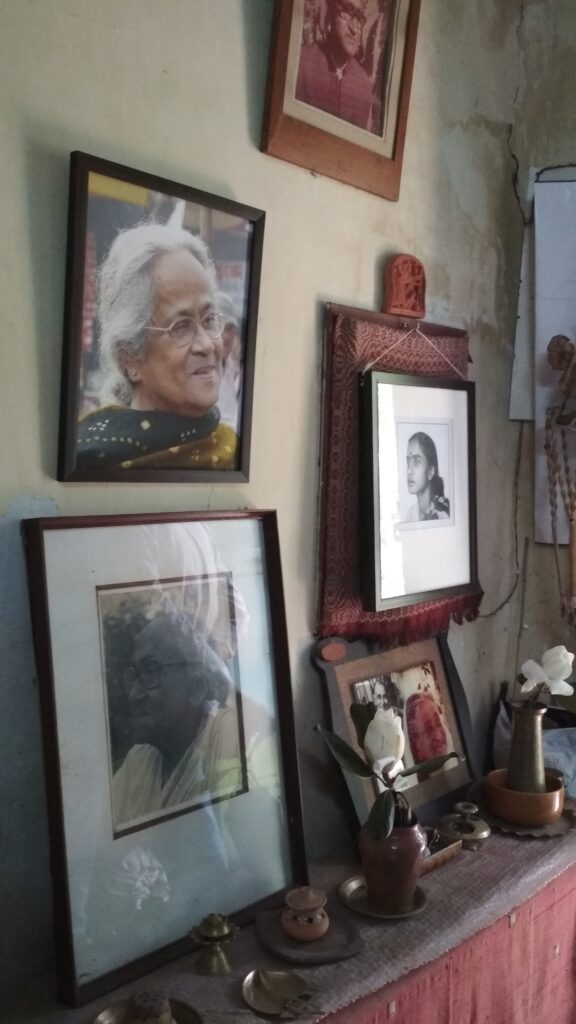
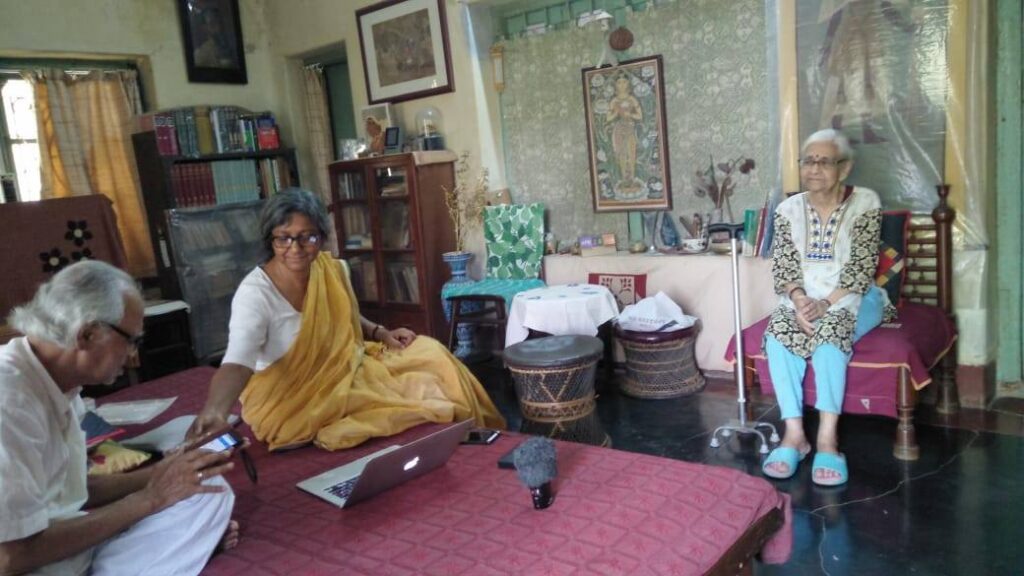
Another old member of the Santiniketan asram with whom I spent time looking at Pinakin Trivedi’s and Arnold Bake’s photographs from the 1920s and 30s was Sri Pradyot Bhanja. Pradyotda has died since, but that morning on 28 April 2019, he had shared with me many stories about life in Santiniketan in the early days. His mother was the famous artist and dancer Gauri Bhanja, who also taught at Kala Bhavan. As dancer and actor, she had played Nati, the court dancer, in the Tagore’s Natir Puja in 1925. Gauri Bhanja’s father was the great guru of Indian art, Nandalal Bose. Sadly, my recorder had run out battery on the day I met Pradyotda in his home in Santiniketan. But I have some photos from his home, and retain in my mind impressions of our very special meeting. He would also send me messages and photographs on my phone. Photos: Sumita Samanta
Finally, a glimpse of the autograph book.
Pages from Pinakin Trivedi’s Autograph Book. All photos taken by Moushumi in Devkumar Trivedi’s house in Delhi in 2017.
Postscript
I sent the website link to Devkumarji and on 5 August 2022, he responded thus:
- Laksmisvar Sinha, a Doorway to Many Worlds
- Imam Bux Boyati of Mymensingh at Gurusaday Dutt’s Suri Mela
- Motru Sen and Jaya Tagore: From Image to Sound
- Mapara’s Cradle Song and Shruthi Vishwanath’s Response
- The Bauls of Kenduli in 1932
- Roof-Making Songs of Baori Women
- Listening to Savitiri Govind with Sumana Chandrasekhar
- From Ranjan Shaha to Kobiyal Akhtar Shah in Kasba, Birbhum
- Kusum, the Nachni and her Jhumur
- From Gurudayal Malik to Mohan Singh Khangura and Madangopal Singh

